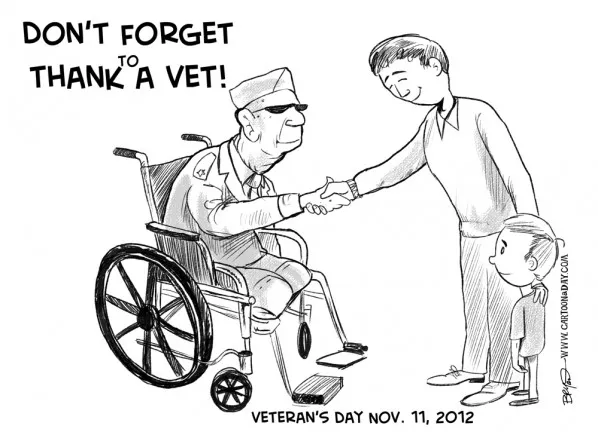
Long Forgotten Is the Role that Veteran Anti-War Activists Played in Ending the Vietnam War
In 1995, Massachusetts Governor William Weld pardoned Joseph Yandle who was then serving a life sentence for first degree murder, stating that Yandle had gone to “serve his country in Vietnam” and “returned a scarred man, and he has served a lengthy prison sentence. [23 years to that point].”
A year earlier, Mike Wallace had done a story on Yandle for 60 Minutes in which he reported that Mr. Yandle had served two tours in Vietnam as a Marine and “came home with a Bronze Star for valor, two Purple Hearts and something else, too: a heroin habit.” That Vietnam-acquired habit had allegedly led him into crime that included a string of armed robberies and cost the life of a liquor store clerk, Joseph Reppucci, in a 1972 holdup that Mr. Yandle helped a partner commit.
After the airing of the 60 Minutes story, W. G. Burkett, a Dallas businessman writing a book about veteran imposters, uncovered discrepancies in Yandle’s story and Yandle was forced to admit that, while he had served in the U.S. military during the Vietnam War, it was as a clerk with the Marines on Okinawa, and he did not win any combat medals.
According to Jerry Lembcke, a sociologist at the College of the Holy Cross (Worcester, MA) who has just published the book The Cult of the Victim-Veteran: MAGA Fantasies in Lost-War America (New York: Routledge, 2024), Yandle’s story is significant because it exemplifies a manufactured veteran-as-victim narrative that has ominous political implications.


During the late 1960s and 1970s, thousands of Vietnam veterans returned from the war politically radicalized and many took part in anti-war protests.

However, a new diagnostic category was then invented—Post-Traumatic Stress Disorder (PTSD)—which pathologized veteran dissent and almost all veteran behavior.
Veterans were reimagined in American political culture as victims of the Vietnam War who had been literally spat upon and betrayed by anti-war activists.
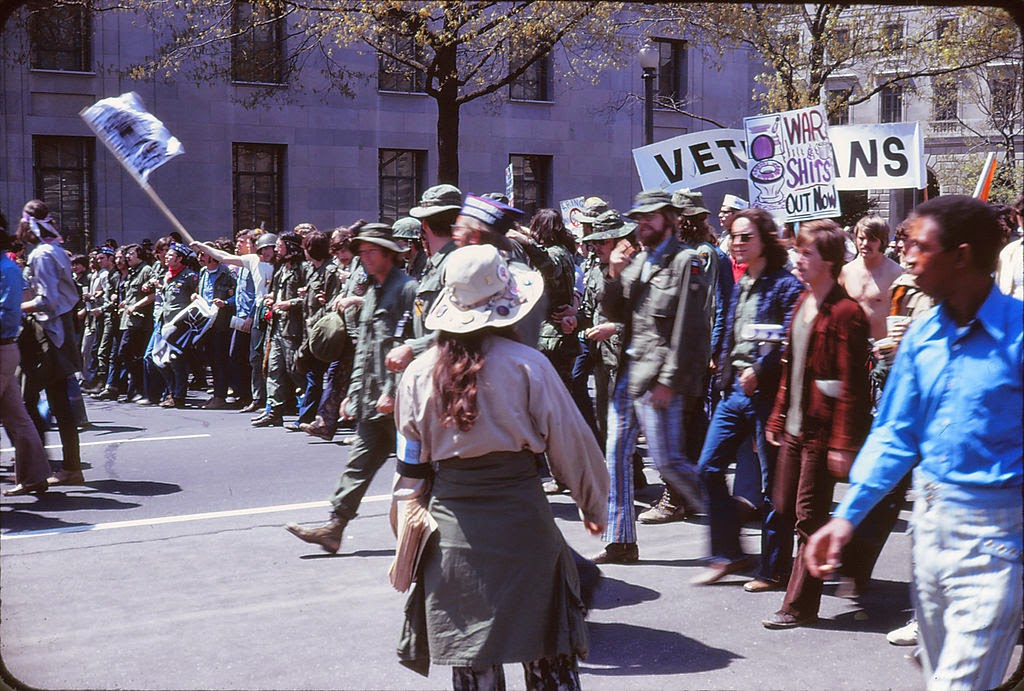
In reality, the notion of veterans being spat upon was an urban legend: Lembcke’s research uncovered few if any such incidents ever took place. Additionally, Lembcke found that a large number of veterans claiming to have been suffering from PTSD had never even served on the war’s front lines. The Christian Science Monitor claimed in 1991 that 50% of Vietnam veterans suffered from PTSD when only 15% saw combat.
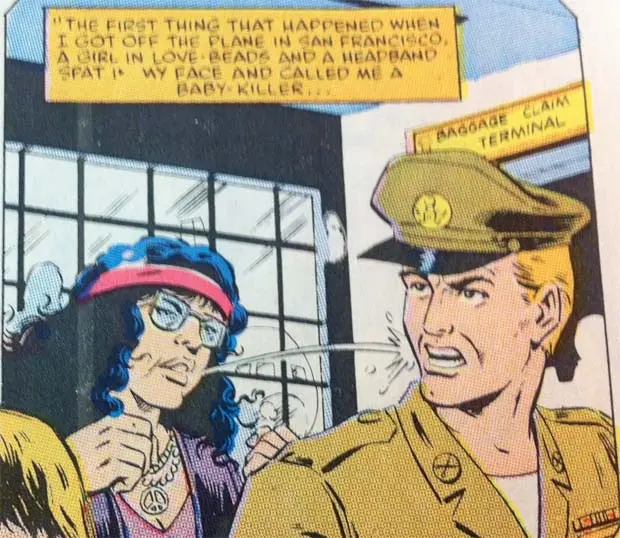
Today, PTSD has become something of a badge of honor for veterans serving in illegal wars for which there are no battlefield heroics, especially since the U.S. military relies increasingly on automated weapon systems and drones.
The cult of the victim veteran is used by political elites to turn attention away from the horrendous human costs of America’s forever wars on subject societies and to scapegoat internal enemies for supposedly betraying the troops.
This resembles Nazi Germany, which adopted the dolchstoss myth scapegoating Jews, communists, women, liberals and pacifists for Germany’s defeat in World War I.
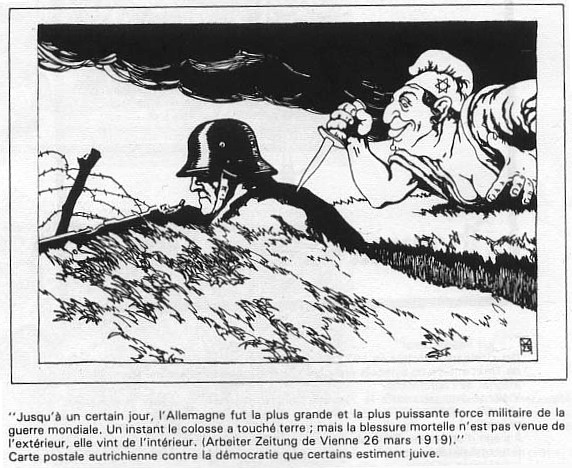
Lembcke says that the invention of the psychiatric condition of shell shock in World War I—like PTSD after Vietnam—helped create the illusion that veterans were victims whose betrayal on the home front had to be avenged.
In the American context, revenge would come by fighting and winning new wars, by expunging domestic enemies, and by restoring America’s supposed cultural vitality from the World War II period—before the treasonous 1960s movements softened and “feminized” America.
Such reactionary impulses, according to Lembcke, have fueled an era of endless wars and the growth of the pseudo-fascist Make America Great Again (MAGA) movement.
Liberals have helped advance the veteran-as-victim narrative fueling revanchist policies because they have often framed criticisms of U.S. policy using the same mental health narratives as conservatives, suggesting that war harms the men and women sent to fight it.
This narrative obscures the far greater harm that U.S. wars have done to subject societies and imperialistic underpinnings of those wars, which liberals primarily support if the damage to American soldiers is not too great.
Discrediting Veteran Anti-War Voices
Lembcke is very critical of psychiatrists who supported the agenda of President Richard M. Nixon and other pro-war leaders beginning in the 1970s by adopting psychiatric labels to stigmatize non-conformist social behavior and veteran dissent.

At the 1972 Republican Party Convention in Miami Beach, Florida, the Nixon administration infiltrated Vietnam Veterans Against the War (VVAW) with agent provocateurs in an attempt to incite violence and make the veterans look crazy.
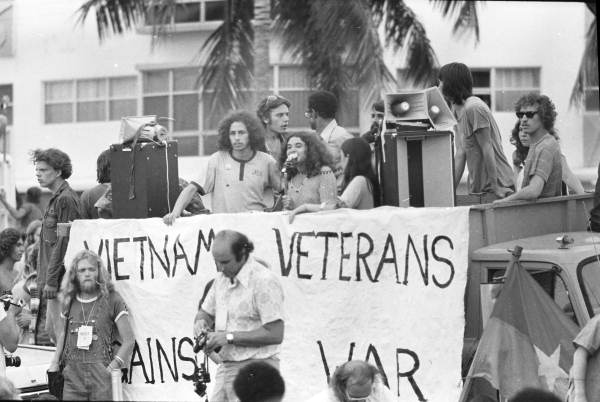
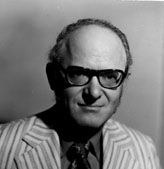
The Nixon schemers’ attempts to discredit veteran dissidents were bolstered by a New York Times op-ed by Dr. Chaim Shatan alleging that Vietnam veterans were a traumatized group and laying out the concept of PTSD.[1]
The Times had rejected Shatan’s piece 15 months earlier but found the timing opportune after months of widespread demonstrations by veterans, including ones where veterans hurled their medals at the Capitol building and admitted to being war criminals.[2]

In the late 1960s, a small group of psychiatrists had been working to formulate a new diagnostic concept that would apply to soldiers psychologically hurt by the Vietnam War, but they were dogged by the same empirical problems that had challenged the veracity of shell-shock during World War I—notably the fact that alleged “shell shock” sufferers were never exposed to exploding shells and there was no way of quantifying what soldiers were experiencing.
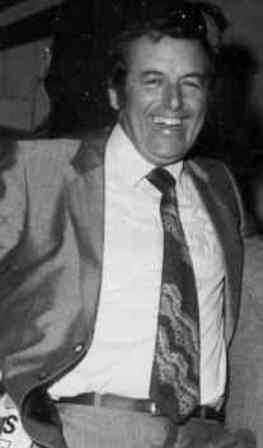
The psychiatrist Peter Bourne had reported objective comparisons of the levels of adrenal secretions associated with stress for combat and non-combat troops in Vietnam and found no difference among helicopter MedEvac crews.[3] Bourne also found higher rates of psychiatric casualties among non-combat soldiers usually having nothing to do with the war.
Bourne’s findings point toward the social construction of PTSD, which Lembcke argues is more of a cultural and political phenomenon than a medical one.
The cult of the veteran as victim was strengthened by attempts to play up the negative health impacts of Agent Orange on servicepersons, which remain unclear, and functions as a diversion from the vast devastation inflicted by the U.S. military on Indochina.[4]
Hollywood played a key role in the myth-making by caricaturing Vietnam veterans as psychologically damaged misfits and criminal junkies when sociological research determined that Vietnam veterans achieved higher socio-economic status than their non-veteran peers and used drugs only in tiny numbers.[5]
One of the films advancing misleading stereotypes was Coming Home (1978) starring famed anti-war activist Jane Fonda, whose character is having an affair with a paraplegic veteran played by Jon Voight, which prompts her husband (played by Bruce Dern), also a Vietnam veteran, to go into a rage and commit suicide. The impression created by the film was that all veterans were damaged psychologically by the war as one of its primary legacies.

The 1980s cult hit Rambo has a scarred veteran going back to Vietnam to fight his own private war without any government constraints to free abandoned POWs so America can achieve a belated victory.

This film has provided a metaphor for U.S. foreign policy ever since in its aim to avenge the “Vietnam Syndrome,” which was ostensibly provoked by weak-willed liberal politicians and the socio-cultural transformations bred by the 1960s movements that softened the nation’s moral fiber.
A Warped Political Culture
Analysts on the left have warned that the MAGA movement is fascist and Trump a wannabe Hitler or Mussolini.
While it is not clear that Trump has the same capabilities as those latter individuals, Lembcke’s book is significant in pointing to the deeply rooted sub-fascist themes in American political culture since the end of the Vietnam War that liberals have helped to advance as much as conservatives.
Labeling returning veterans as sufferers of PTSD may seem innocuous and well-meaning, but Lembcke spells out the real-world implications that sideswipe debate about America’s imperial role in the world.
It is part of a warped political culture that was used in the past to stigmatize and denigrate anti-war veterans and that transforms agents of empire into victims of traitorous domestic forces and a feminized culture that need to be eradicated.

-
The term PTSD wasn’t used in 1972, Shatan called it “Military Trauma.” ↑
-
After publication of Shatan’s piece, Shatan said that his phone began jumping off the wall, resulting in the organization of academic conferences and public forums followed by the formal professional adoption of PTSD by the American Psychiatric Association (APA). ↑
-
Jerry L. Lembcke, The Cult of the Victim-Veteran: MAGA Fantasies in Lost-War America (New York: Routledge, 2024), 43. ↑
-
Science historian David Zierler concluded in a 2011 study that “epidemiological studies on U.S. veterans dating back twenty years have so far been unable to establish a conclusive link between Agent Orange [a chemical herbicide sprayed in Vietnam to deprive the enemy of jungle cover] and a variety of cancers and other health maladies that some servicemen have attributed to the herbicide.” Lembcke, The Cult of the Victim-Veteran, 62; David Zierler, The Invention of Ecocide: Agent Orange, Vietnam, and the Scientists Who Changed the Way We Think About the Environment (Athens: University of Georgia Press, 2010). ↑
-
See Jeremy Kuzmarov, The Myth of the Addicted Army: Vietnam and the Modern War on Drugs (Amherst, MA: University of Massachusetts Press, 2009). ↑
CovertAction Magazine is made possible by subscriptions, orders and donations from readers like you.
Blow the Whistle on U.S. Imperialism
Click the whistle and donate
When you donate to CovertAction Magazine, you are supporting investigative journalism. Your contributions go directly to supporting the development, production, editing, and dissemination of the Magazine.
CovertAction Magazine does not receive corporate or government sponsorship. Yet, we hold a steadfast commitment to providing compensation for writers, editorial and technical support. Your support helps facilitate this compensation as well as increase the caliber of this work.
Please make a donation by clicking on the donate logo above and enter the amount and your credit or debit card information.
CovertAction Institute, Inc. (CAI) is a 501(c)(3) non-profit organization and your gift is tax-deductible for federal income purposes. CAI’s tax-exempt ID number is 87-2461683.
We sincerely thank you for your support.
Disclaimer: The contents of this article are the sole responsibility of the author(s). CovertAction Institute, Inc. (CAI), including its Board of Directors (BD), Editorial Board (EB), Advisory Board (AB), staff, volunteers and its projects (including CovertAction Magazine) are not responsible for any inaccurate or incorrect statement in this article. This article also does not necessarily represent the views the BD, the EB, the AB, staff, volunteers, or any members of its projects.
Differing viewpoints: CAM publishes articles with differing viewpoints in an effort to nurture vibrant debate and thoughtful critical analysis. Feel free to comment on the articles in the comment section and/or send your letters to the Editors, which we will publish in the Letters column.
Copyrighted Material: This web site may contain copyrighted material the use of which has not always been specifically authorized by the copyright owner. As a not-for-profit charitable organization incorporated in the State of New York, we are making such material available in an effort to advance the understanding of humanity’s problems and hopefully to help find solutions for those problems. We believe this constitutes a ‘fair use’ of any such copyrighted material as provided for in section 107 of the US Copyright Law. You can read more about ‘fair use’ and US Copyright Law at the Legal Information Institute of Cornell Law School.
Republishing: CovertAction Magazine (CAM) grants permission to cross-post CAM articles on not-for-profit community internet sites as long as the source is acknowledged together with a hyperlink to the original CovertAction Magazine article. Also, kindly let us know at info@CovertActionMagazine.com. For publication of CAM articles in print or other forms including commercial internet sites, contact: info@CovertActionMagazine.com.
By using this site, you agree to these terms above.
About the Author

Jeremy Kuzmarov holds a Ph.D. in American history from Brandeis University and has taught at numerous colleges across the United States. He is regularly sought out as an expert on U.S. history and politics for radio and TV programs and co-hosts a radio show on New York Public Radio and on Progressive Radio News Network called “Uncontrolled Opposition.”
He is Managing Editor of CovertAction Magazine and is the author of six books on U.S. foreign policy, including Obama’s Unending Wars (Clarity Press, 2019), The Russians Are Coming, Again, with John Marciano (Monthly Review Press, 2018), Warmonger. How Clinton’s Malign Foreign Policy Launched the U.S. Trajectory From Bush II to Biden (Clarity Press, 2023); and with Dan Kovalik, Syria: Anatomy of Regime Change (Baraka Books, 2025).
Besides these books, Kuzmarov has published hundreds of articles and contributed to numerous edited volumes, including one in the prestigious Oxford History of Counterinsurgency .
He can be reached at jkuzmarov2@gmail.com and found on substack here.


This article implies that only combat veterans can suffer from PTSD. But actually non-combat veterans can also suffer from PTSD.
https://solaramentalhealth.com/can-non-combat-veterans-have-ptsd/#:~:text=Some%20groups%20have%20a%20common,population%20can%20suffer%20from%20PTSD.
A very curious article, to be sure. The notion that the dioxin in Agent Orange and other defoliants is not significantly harmful is at odds with a significant body of scientific evidence. Likewise the idea that psychological dysfunction as a result of persistent stress induced by aspects of war is simply a propaganda construct is also at odds with a body of scientific evidence.
There is no doubt that all manner of chicanery has been used to justify the atrocity of US imperialism. However, the assertions made in this article are inconsistent with an array of analyses related to these phenomena.
“…and he did not win any combat medals.”
A better description would be “…and he was not awarded any combat medals.” The recipients of such awards don’t feel like they’ve “won” anything except a lifetime of nightmares that will probably follow, disabling wounds that may be permanent, the loss of friends who died violently, etc. Often medals are awarded posthumously, so the recipients definitely didn’t “win” anything.
“The cult of the veteran as victim was strengthened by attempts to play up the negative health impacts of Agent Orange on servicepersons, which remain unclear…”
Currently a friend of mine who was in the 1st Battalion, 7th Cavalry, 3d Brigade (Separate), 1st Cavalry Division (Airmobile) in 1971-72 is dealing with bladder cancer as a result of his exposure to Agent Orange and there’s nothing unclear about it. He has remarked that it would be a hell of a thing for something from his Vietnam time to kill him now, over half a century after he left. What he’s going through is something countless others have also had to deal with. The war is over but the dying continues. Veterans are killed by exposure to such things as Agent Orange while Vietnamese are affected as well. The latter have also suffered injuries and death from unexploded ordnance they’ve come up, long stationary but still deadly.